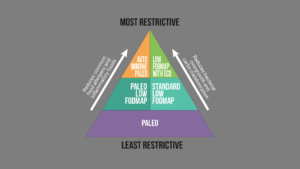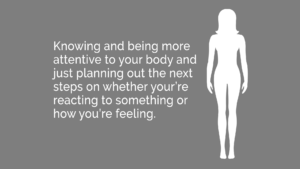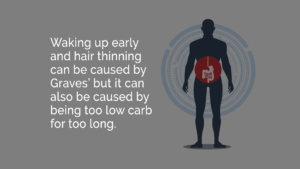Success with Graves Disease Using Functional & Conventional Medicine
Graves’ disease is a condition in which the body produces too much thyroid hormone, essentially the opposite of Hashimoto’s hypothyroid. However, both Hashimoto’s and Graves’ have an underlying immune component thus making functional medicine a management consideration. Today we speak with Zenaida who has overcome Graves’ with a combination of functional and conventional medicine care, and is now off all medication. Her case illustrates that both can be used together quite successfully.
Conversation with my patient Zenaida who has overcome Graves’ disease.
- Graves’ disease is a condition in which the body produces too much thyroid hormone
- You do not need to order a lot of testing in order to treat Graves’ disease
- While the treatment process can take some time, the most important thing a patient can do is listen to their own body and how it reacts to treatment versus following everything they read online
- A combination of functional and conventional medicine care was used to help her overcome Graves’ disease
For more information, read our article on Natural Management of Grave’s Disease.
Download this Episode (right click link and ‘Save As’)
Dr. Michael Ruscio: Hi, this is Dr. Ruscio. I’m here with Zenaida who has done great with Graves’. And twisted her arm to get her to sit down and chat today. We’ve been working together now a little over two years I believe.
Zenaida: Yeah, since 2016.
DrMR: Yeah. And you first came in with Graves’. It was a mild case of Graves’ and you had responded really well to methimazole which is one of the frontline medications that’s used. But you wanted to see what else you could do not to need the medication and to kind of manage the Graves’.

Zenaida: Yeah. It was a process on its own. Before I met you, I did a lot of research obviously and just wanting to find a more holistic functional way to treat things rather than the conventional side of things.
DrMR: Sure. Which I think makes sense because methimazole I think is a fairly good drug, but a basic question, what else could we do besides methimazole to mitigate the need for the methimazole? And you’ve been off the methimazole now for, what, about six months?
Zenaida: Yeah. Six months.
DrMR: Six months.
Zenaida: Yeah.
DrMR: So now she’s been off the methimazole for about six months and also weaned off a good amount of the items in our natural program and expanded her diet. And that was one of the things we talked about today was not being afraid of food, not getting freaked out about the stuff you read on the internet and finding your own tolerance to these different foods based upon your reintroduction. Gluten seems to be the one food, thankfully, out of all off them. The only food that you’re really reactive to is gluten, so you’re avoiding that. Find anything else there that you think is noteworthy?

DrMR: Great point.
Zenaida: And just planning out the next steps on whether you’re reacting to something or how you’re feeling because that’s huge. Just being more mindful and knowing the things we are reacting to, figuring out how to make you feel better.
And that was the biggest process of this whole journey. Definitely there’s some things that I’m working on, like sleep and hair obviously. But definitely this whole journey taught me how to eat better. It’s given me better habits on just living life and changing my lifestyle.
DrMR: Yeah. And you make a lot of great points. I think it is, just like you said, important to listen to your body because if you don’t listen to your body, then you listen to everyone else. And there’s all these dietary restrictions recommended. And so, you can just get pulled further and further into dietary restrictions rather than like you’re doing now which is broadening your diet and figuring out the broadest diet possible.
So yeah, I think listening to your body is really key. And then also, just keeping in mind that with time your body will heal and you’ll get a lot—if things are done right, you’ll improve a lot. And in your case, there’s I think one simple thing and we talked about adrenal testing and a lot of things that I think are putting the cart before the horse. But right now, the final tweak, at least in my mind and we’ll know this better probably in about three or four weeks, is your carb intake may be a little bit too low. And that may be what’s driving your only two lingering complaints which are getting better with time, but they’re not fully kind of getting better, which are waking up early and hair thinning. And that can be caused by Graves’, but it can also be caused by being too low carb for too long.

Zenaida: Yeah. It’s definitely the art of fine-tuning.
DrMR: Yeah, fortunately you’re at the fine-tuning phase, which is great.
Zenaida: Definitely. Definitely it was—things don’t happen overnight. Throughout this whole journey, you see improvements as you go along, but you know that you’re getting somewhere. The positive side of things is that you’ll know yourself better just by all things that you’re observing, and you’ll feel better too.
DrMR: And just one thing, this is a point I’m passionate about and I know the audience knows this. We did some testing. But would you say we did a lot of testing?
Zenaida: We didn’t. No.
DrMR: No. And we didn’t need to. Use testing to kind of get a lay of the land and figure out what some of the key aspects are and that’s it. You don’t need to… I didn’t need to beat you over the head with this constant repeat testing, and a lot of this stuff is just good clinical horse sense, steering the ship. You’ve done great. She’s got a beautiful family. They were all in here just a few minutes ago.
And I’m super happy with how you did. A couple of little things we’ll tweak now, but I think in a few weeks you’ll be pretty much at like 99%. And I’m really happy for you.
Zenaida: Thank you.
DrMR: Yeah. And thank you for taking the time to share with us.
Zenaida: Definitely.
What do you think? I would like to hear your thoughts or experience with this.
- Get help with Graves’ Disease.
- Get your personalized plan for optimizing your gut health with my new book.
- Healthcare providers looking to sharpen their clinical skills, check out the Future of Functional Medicine Review Clinical Newsletter.



Discussion
I care about answering your questions and sharing my knowledge with you. Leave a comment or connect with me on social media asking any health question you may have and I just might incorporate it into our next listener questions podcast episode just for you!